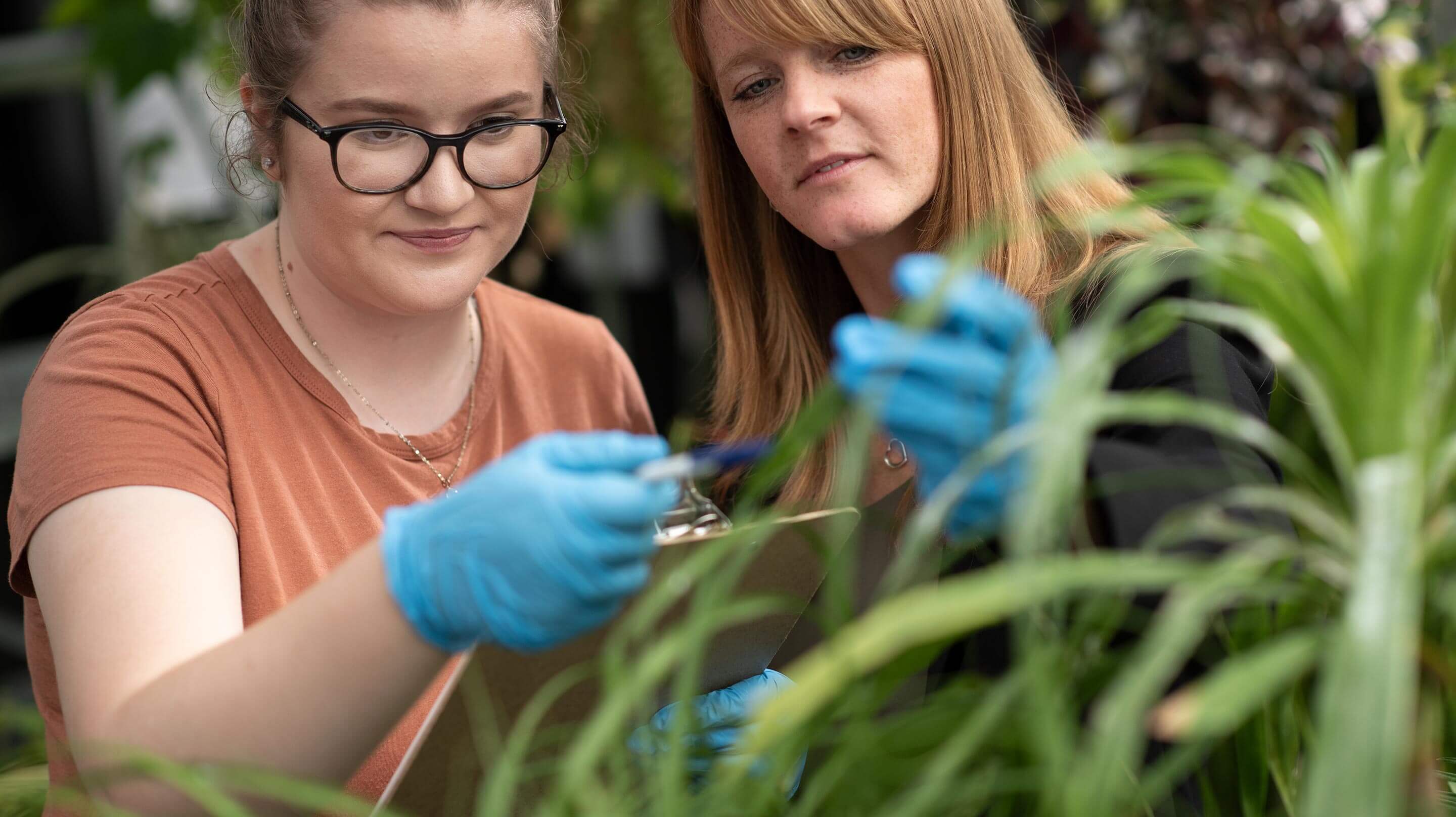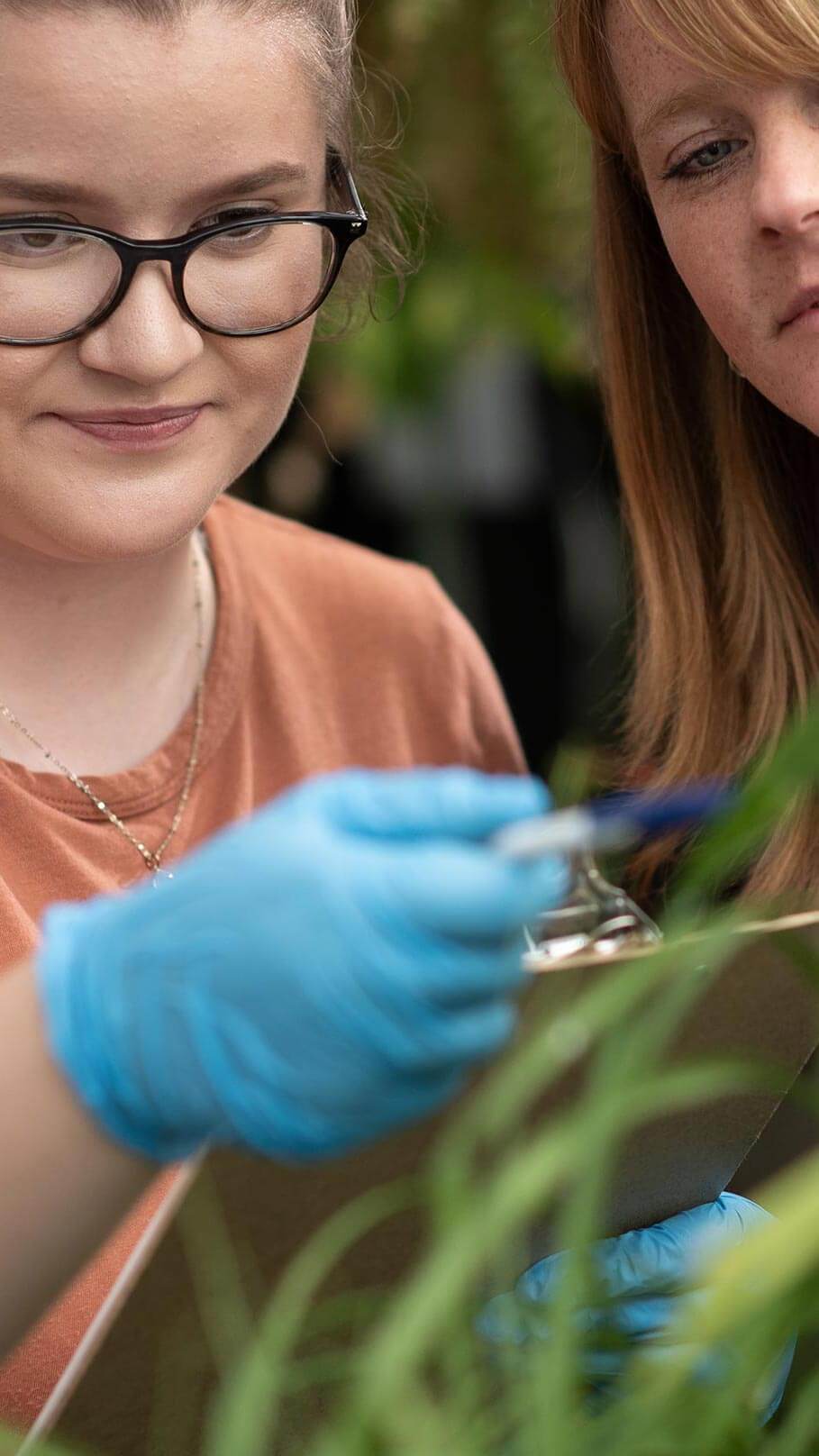Environmental Studies Courses
Four-Year Major: Environmental Studies (15 courses):
Cognate Requirements:
General Major: Environmental Studies (12 courses):
- ENV-121; 222; 364; 366; 368;
- GEO-122;
- One of GEO-121 or ECO-122;
- Five of ENV-241, ENV-360, ENV-362, ENV-370-79, GEO-214, GEO-225, GEO-330, MAT-201, POL-201, POL-210, POL-306, or courses offered at Au Sable (at least one course must be at the 300-level)
Cognate Requirement:
Minor: Environmental Studies (6 courses):
Cognate Requirements:
Notes:
- For the Honours and Four-Year Major programs, students must choose a minor other than Geography.
- Up to four courses from Au Sable may be applied towards ENV major or minor requirements.
- Au Sable courses are completed at an additional cost to students during the summer (selected courses are offered in the winter), but scholarships and bursaries are available to offset the cost. For more information on the Au Sable course offerings, speak with Dr. Berkelaar or visit www.ausable.org.
Course Details
Environmental Studies I: Population, Resource Use, and Cities ENV-121
An exploration of the foundations of contemporary environmental studies. The course will deal with topics such as the environmental impact of cities, human population growth, renewable and non-renewable resources, environmental NGOs, and environmental policy. Includes regular field trips.
Environmental Studies II: Pollution and Climate Change ENV-222
As a general introduction to environmental science, the course will deal with some of the chemical and physical processes within creation and discuss the impact of humans on the biosphere. Topics will include the following: element cycles, energy, air pollution, and climate change. Includes a weekly three-hour lab. Materials fee applies.
Ecology and Evolution ENV-235
An introduction to organismal and physiological ecology (the inter-actions of organisms with their physical environment), population and community biology, and the structure and function of ecosystems. Includes a weekly three-hour lab or field work. Materials fee applies.
Prerequisites:
BIO-122
Environmental Literature ENV-241
Studying literary works through an ecological lens will inform and nuance students’ perceptions of the relationship between culture and nature, the foundation of our current environmental sensibilities, and the role of human beings in the care and sustenance of the earth. Using regional and thematic approaches, the course considers the links between literary appreciation and social action.
Prerequisites:
ENG-103 or 104 (Recommended)
Field Biology ENV-315
A course designed to increase the exposure of students to organisms in their field settings. Topics discussed include biogeography, the observation of the integration of structural and functional diversity in local ecosystems, techniques in taxonomy, population sampling, and hypothesis testing in the field. Some field work will be scheduled for Saturdays. Includes a weekly three-hour lab or field work. Materials fee applies.
Prerequisites:
BIO-232
Environmental Impact Assessment ENV-360
This course will examine the approaches to completing environmental assessments (EIAs) and include a specific focus on Canadian EIA processes. Throughout the course, students will be introduced to methods for conducting assessments and they will critique current practices used in the field. Students will also reflect on current approaches to environmental management and discuss the role of Christian stewardship as it relates to environmental management and sustainability.
Prerequisites:
ENV-222Year 3 or 4 standing
Resource Management ENV-362
This course will introduce concepts of natural resource management and how management of these resources affects the quality of life for both current and future generations. The course will present examples of misuse of resources as well as current management practices that result in conservation and more sustainable use of natural resources. Students will gain an appreciation for the challenges faced by managers as they examine the economic and environmental aspects of resource management.
Prerequisites:
ENV-222Year 3 or 4 standing
Introduction to Geographic Information Systems ENV-364
This course will examine multiple applications of GIS in a cross functional format. Throughout the course, students will be introduced to cartographic and analytic tool sets on a GIS platform and be required to apply those skills in real world applications. Students will also have the opportunity to apply their new GIS skillset on campus in meaningful ways that help the students reflect on the role of GIS within their
respective programs as well as providing a benefit to Redeemer University through the collection of new data about the campus grounds. *Students will need access to a computer with a Windows operating system.
Prerequisites:
ENV-222 or GEO-121; Year 3 or 4 standing
Environmental Philosophy ENV-366
A critical exploration of philosophical ideas that shape and promote environmental awareness, protection and stewardship, as well as those which are a hindrance to a Christian understanding of the subject.
Prerequisites:
Year 3 or 4 standing. ENV-366 is the Capstone Course for the Environmental Studies Department and is required for all majors in the 3rd or 4th year.
Population, Food and Sustainability ENV-368
A critical look at, and discussion of, the fundamental environmental issues of global population, food production, and what it might look like to provide for our needs in a more sustainable manner.
Prerequisites:
ENV-222Year 3 or 4 standing
Special Topics ENV-370-79
Topics could include Ethics or Sustainable Development.
Prerequisites:
ENV-222Year 3 or 4 standing
Senior Seminar I ENV-381
These courses consist of a weekly one-hour seminar that explores the contexts for the disciplines of chemistry and environmental science, including historical, theological, ethical, societal, and vocational dimensions. The seminars will also equip students to carry out scientific research in the fields of chemistry and environmental science.
(0.75 credits each)
Prerequisites:
Year 3 or 4 standing in an Environmental Science major
Senior Seminar II ENV-382
These courses consist of a weekly one-hour seminar that explores the contexts for the disciplines of chemistry and environmental science, including historical, theological, ethical, societal, and vocational dimensions. The seminars will also equip students to carry out scientific research in the fields of chemistry and environmental science.
(0.75 credits each)
Prerequisites:
Year 3 or 4 standing in an Environmental Science major
Senior Seminar III ENV-383
These courses consist of a weekly one-hour seminar that explores the contexts for the disciplines of chemistry and environmental science, including historical, theological, ethical, societal, and vocational dimensions. The seminars will also equip students to carry out scientific research in the fields of chemistry and environmental science.
(0.75 credits each)
Prerequisites:
Year 3 or 4 standing in an Environmental Science major
Senior Seminar IV ENV-384
These courses consist of a weekly one-hour seminar that explores the contexts for the disciplines of chemistry and environmental science, including historical, theological, ethical, societal, and vocational dimensions. The seminars will also equip students to carry out scientific research in the fields of chemistry and environmental science.
(0.75 credits each)
Prerequisites:
Year 3 or 4 standing in an Environmental Science major
Land Resources BIOL/GEOL/GEOG-301
Available through the Au Sable Institute of Environmental Studies. For more information on Au Sable, see the Academic Calendar.
A systems level perspective on land forms and ecosystems. Includes analysis and interpretation of field data, remote-sensing data derived from satellites, and aircraft and geographic information systems (GIS). Field trips to, and analysis of, forests, wetlands, lakeshores, and rivers included. Also includes application to policy and land use planning.
Prerequisites:
One year of introductory science
Watersheds in Global Development BIOL/GEOG-355
Available through the Au Sable Institute of Environmental Studies. For more information on Au Sable, see the Academic Calendar.
Includes principles of watershed ecology, principles and practice of community-based water monitoring and watershed management for developing and developed countries and data access and analysis using an online relational database and data-to-action strategies. Designed for students in science and public policy, including students interested in missions and development, and agencies involved in environmental assessment and community development.
Prerequisites:
One year of general biology
Toxicology ENV-432
Toxicology is the field of study which seeks to understand the adverse effects of toxic substances (chemical, physical, and/or biological) to living organisms. Fundamental concepts will be addressed such as dose-response relationships, mechanism of uptake, transport, distribution and storage of xenobiotics, detoxification and depuration, target organ toxicity and physiological consequences (e.g. teratogenesis,
mutagenesis, carcinogenesis), and risk assessment techniques. Includes a weekly three-hour lab. Materials fee applies.
Prerequisites:
BIO-242 or 261
Conservation Biology BIOL/GEOG-471
Available through the Au Sable Institute of Environmental Studies. For more information on Au Sable, see the Academic Calendar.
Principles of conservation biology with applications to sustainable human society and biospheric integrity. An integrative approach to biology and society that interrelates population biology, ecological principles, biogeochemical cycles, ecosystem functions, and human society in the context of biospheric degradation. The course develops a stewardship perspective rooted in biological principles and directed at conservation
of plant and animal species, biotic communities, ecosystems, and human society. Included are topics of human development, poverty, and economic growth.
Prerequisites:
One year of general biology and one course in ecology or permission of the instructor
Internship ENV-480
A one-term training experience in a specific area of environmental studies. The purpose of the internship is to give students on-the-job experience and to help students in making career decisions and in preparing students for post-graduate education and for employment opportunities. See page 61 of the Academic Calendar for information on internships.
Prerequisites:
Year 4 standing
Independent Study ENV-485
This course gives students the opportunity to explore a unique area of independent study not normally offered in the curriculum. For more information on setting up an independent study see page 60 of the Academic Calendar.
Prerequisites:
Year 4 standing
Independent Research Project ENV-490
This course is typically a one-term undergraduate research project. Students will plan, carry out, analyze, interpret, and present results of a departmentally-approved research project. The course is especially intended for students applying to graduate school. For more information on setting up an independent research project see page 61 of the Academic Calendar.
Prerequisites:
Year 4 standing



